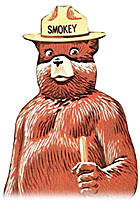
![]() Commie Spy? (Jan.
25): State Department official Alger Hiss is sentenced to five years in
prison after his conviction on two counts of perjury. Hiss was investigated
by the House Un-American Activities Committee after allegations of communist
espionage.
Commie Spy? (Jan.
25): State Department official Alger Hiss is sentenced to five years in
prison after his conviction on two counts of perjury. Hiss was investigated
by the House Un-American Activities Committee after allegations of communist
espionage.
McCarthy Era (Feb 9): A relatively unknown U.S. senator touches off a firestorm of fear when he claims that communist agents have infiltrated the government and hold crucial positions. Sen. Joseph McCarthy, R-Wis., soon holds hearings to prove his allegations and "McCarthyism" becomes a household word. A Senate panel in July concludes his accusations have no foundation. His tirades will end in December 1954, when his fellow senators censure him for misconduct.
First of Many (May 5): Elizabeth Taylor marries hotel heir Nick Hilton. Her former nanny is quoted as saying: "Elizabeth loves and respects Mr. Hilton. He feels the same about her. That's why this will be the first and last marriage for both of them."
Korean Conflict (June 25): The North Korean army crosses into neighboring South Korea. President Truman calls on the United Nations to check "unwarranted aggression" against the democratic government in South Korea. On June 27, he authorizes Gen. Douglas MacArthur to provide naval and air power to aid the Republic of Korea.
 Seoul's
Survival (Sept. 15): U.N. forces, led by American troops, launch
a massive amphibious invasion at Inchon, South Korea. Fierce fighting
continues, with U.N. forces liberating Seoul on Sept. 26 and reaching
the North's capital, Pyongyang, a month later.
Seoul's
Survival (Sept. 15): U.N. forces, led by American troops, launch
a massive amphibious invasion at Inchon, South Korea. Fierce fighting
continues, with U.N. forces liberating Seoul on Sept. 26 and reaching
the North's capital, Pyongyang, a month later.
Charlie Brown's Debut (Oct. 2): The United Feature Syndicate begins distributing "Peanuts" by Charles Schulz.
Crude Line (Oct. 6): The world's longest pipeline is constructed between the Persian Gulf and the Mediterranean Sea.
Assassination Attempt (Nov. 1): An attempt by two Puerto Rican nationalists to assassinate President Truman ends in a gunbattle between the armed men and Capitol police. The shoot-out takes the lives of one assailant and a police officer. The second gunman is arrested. Truman is unaware of the incident until it is over.
Dogfight (Nov. 8): The first jet battle takes place during the Korean War. American Air Force pilot Russell Brown downs a North Korean MiG-15.
A Nobel First (Dec. 10): U.N. diplomat Ralph J. Bunche becomes the first black person to win the Nobel Peace Prize. Bunche, grandson of a slave, receives the award for mediating the conflict between Arabs and Israelis.
|
What's Hot Births Julius Erving, basketball player (Feb. 22) Mark Spitz, Olympic swimmer (Feb. 10)
Stevie Wonder, singer (May 13) Gary Larson, cartoonist (Aug. 14) Bill Murray, actor-comedian (Sept. 21) Deaths Max Beckmann, German artist (born 1884) Kurt Weill, composer (born 1900) Edna St. Vincent Millay, poet (born 1892) |
 A badly burned black bear cub, found clinging to a charred tree
in New Mexico's Lincoln National Forest, becomes the inspiration
for one of America's more enduring icons: Smokey Bear. The orphaned
cub is flown by rangers to Santa Fe, where his paws are treated
and he is nursed back to health at a game warden's home. He is shipped
to the National Zoo in Washington, D.C., and posters appear showing
Smokey and bearing the message: "Only You Can Prevent Forest Fires."
Smokey will be officially retired as the Forest Service symbol in
May 1975 and will die in 1976.
A badly burned black bear cub, found clinging to a charred tree
in New Mexico's Lincoln National Forest, becomes the inspiration
for one of America's more enduring icons: Smokey Bear. The orphaned
cub is flown by rangers to Santa Fe, where his paws are treated
and he is nursed back to health at a game warden's home. He is shipped
to the National Zoo in Washington, D.C., and posters appear showing
Smokey and bearing the message: "Only You Can Prevent Forest Fires."
Smokey will be officially retired as the Forest Service symbol in
May 1975 and will die in 1976. 